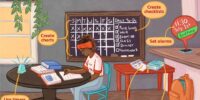Do These Activities to Promote Early Literacy Skills

Promoting early literacy skills is crucial for setting children up for a lifetime of learning. One effective way to do this is through fun activities and daily routines. By incorporating language and literacy into everyday tasks, children can develop a love for language from a young age. For example, parents can read books to their children before bedtime or during meal times. They can also engage in interactive activities such as singing songs, playing word games, or telling stories. These activities not only help build vocabulary and comprehension skills but also create positive associations with reading and language. By making literacy a regular part of daily life, parents and caregivers can ignite a love for language in children and lay the foundation for a lifetime of learning.
Key Takeaways
- Incorporate language and literacy into daily routines to create positive associations with reading and language.
- Engage in regular read alouds and encourage active participation to foster comprehension skills and critical thinking abilities.
- Engage in letter recognition and letter sound activities to develop a solid foundation for reading and writing.
- Use interactive and engaging games for letter tracing practice to improve letter recognition skills and aid in handwriting and fine motor skills development.
Read Alouds
When it comes to promoting early literacy skills, one of the most effective strategies is engaging in regular read alouds. By sharing interactive storybooks with young children, you not only introduce them to the wonders of literature but also provide them with a valuable opportunity to develop their language skills.
As you read aloud, encourage the child to actively participate in the storytelling process. Ask them questions about the characters, the plot, and their predictions for what might happen next. This interactive approach not only fosters their comprehension skills but also cultivates their critical thinking abilities.
In addition to interactive storybooks, incorporating phonemic awareness exercises during read alouds can further enhance a child's literacy development. As you read, emphasize the sounds of the words and encourage the child to identify and repeat them. This helps them develop their phonemic awareness, the ability to recognize and manipulate individual sounds in words.
Letter Recognition Games
Are you looking for fun and effective ways to help your child recognize letters? Look no further!
In this section, we'll explore three engaging letter recognition games that will make learning the alphabet a breeze.
Get ready for an alphabet matching game, exciting letter sound activities, and interactive letter tracing practice.
These activities won't only build your child's letter recognition skills but also foster a love for learning.
Let's dive into the world of letters together!
Alphabet Matching Game
Engage young learners in the exciting world of letter recognition games with the interactive and captivating Alphabet Matching Game.
This hands-on activity is designed to promote interactive learning and develop early literacy skills in a fun and engaging way. By matching uppercase and lowercase letters, children not only enhance their letter recognition abilities but also reinforce their understanding of the alphabet.
The Alphabet Matching Game creates an immersive and stimulating environment where kids can actively participate and learn at their own pace. Through this interactive experience, children develop a solid foundation for reading and writing, fostering a love for language and communication.
Letter Sound Activities
To develop strong letter recognition skills, immerse yourself in a world of interactive and captivating letter sound activities. Engage in sound blending exercises and phonemic awareness activities to enhance your understanding of letter sounds and their corresponding phonemes. Here are four letter sound activities that can make learning enjoyable and effective:
- Sound Sort: Listen to different words and categorize them based on their initial sound. This activity helps you identify the sound each letter makes and develop phonemic awareness.
- Sound Bingo: Play a game of bingo where the caller says a word and you match it with the corresponding letter sound on your bingo card. This activity reinforces letter-sound associations.
- Sound Hunt: Go on a sound hunt around your home or school, identifying objects that start with specific letter sounds. This activity encourages you to listen carefully and make connections between sounds and letters.
- Sound Puzzles: Solve puzzles where you match pictures with their corresponding letter sounds. This activity reinforces letter-sound relationships and improves visual and auditory discrimination skills.
Letter Tracing Practice
Now that you've immersed yourself in the captivating world of letter sound activities, let's dive into the next exciting subtopic of letter tracing practice. This activity allows you to further enhance your letter recognition skills through interactive and engaging games. Not only does letter tracing practice help with handwriting, but it also aids in fine motor skills development. By engaging in these activities, you can improve your ability to form letters correctly and develop the necessary control and coordination of your hand movements.
To make the learning process even more enjoyable, here are some interactive letter tracing games you can try:
| Game Name | Description | Benefits |
|---|---|---|
| Letter Race | Compete against a timer or a friend to trace letters as quickly as possible. | Enhances letter recognition and improves speed and accuracy. |
| Letter Puzzles | Solve puzzles by tracing the outline of each letter to complete the picture. | Boosts letter recognition and problem-solving skills. |
| Sensory Tracing | Use different materials like sand, shaving cream, or gel bags to trace letters with your fingers. | Engages multiple senses and improves tactile awareness. |
| Magnetic Tracing | Arrange magnetic letters on a magnetic board and trace over them with a stylus or your finger. | Reinforces letter recognition and encourages creativity. |
Rhyming Activities
Rhyming activities enhance early literacy skills by fostering phonemic awareness and promoting a love for language through playful exploration. Engaging children in rhyming games and nursery rhymes can have a profound impact on their language development. Here are four reasons why rhyming activities are beneficial for young learners:
- Phonemic Awareness: Rhyming activities expose children to the sounds and patterns of language. By identifying and producing rhyming words, children develop their ability to hear and manipulate individual sounds, which is crucial for reading and spelling.
- Vocabulary Expansion: Nursery rhymes are filled with rich vocabulary and imaginative characters. Through rhyming activities, children are exposed to new words and concepts, expanding their vocabulary and building a solid foundation for future learning.
- Language Play: Rhyming activities encourage children to play with language, fostering a sense of creativity and joy in communication. This playful exploration of sounds and words not only improves their linguistic skills but also nurtures a lifelong love for language.
- Memory and Sequencing Skills: Reciting and memorizing nursery rhymes helps children develop memory and sequencing skills. The repetitive nature of rhyming activities allows children to internalize patterns and sequences, enhancing their capacity for recall and organization.
Incorporating rhyming activities into a child's daily routine can be a fun and effective way to promote early literacy skills. So, why not dive into the world of rhymes and watch your child's language abilities flourish?
Storytelling and Puppet Shows
Are you ready to embark on a magical journey through the power of storytelling and puppet shows?
Let's explore the benefits of these enchanting activities that not only captivate young minds but also promote early literacy skills.
Through storytelling, children develop their imagination, language skills, and listening comprehension, while puppet shows engage their visual and tactile senses, fostering creativity and social interaction.
Get ready to unlock the wonders of storytelling and puppetry, creating unforgettable moments of joy and learning for children.
Benefits of Storytelling
Engage young minds and nurture their early literacy skills through the captivating power of storytelling and puppet shows. Storytelling has numerous benefits and is an essential component of early childhood development.
Here are four reasons why storytelling is important for children:
- Language development: Listening to stories helps children expand their vocabulary, improve sentence structure, and enhance their communication skills.
- Cognitive development: Storytelling fosters imagination, critical thinking, and problem-solving abilities in children. It stimulates their brains and encourages them to explore new ideas and concepts.
- Emotional development: Through stories, children learn about empathy, emotions, and social interactions. They can identify with characters and understand different perspectives.
- Bonding and connection: Sharing stories creates a special bond between children and their caregivers. It provides an opportunity for quality time, encourages conversation, and strengthens relationships.
Engaging Puppet Show Techniques
Discover the enchanting world of puppet shows, a captivating technique that brings storytelling to life and engages young minds in a unique and interactive way. Puppet shows not only entertain but also serve as a powerful tool for promoting early literacy skills in children. Through puppet shows, children can develop their language skills, imagination, and creativity.
One of the key puppet show techniques is improvisation. By encouraging children to use their imagination and come up with their own stories, puppet shows provide a platform for them to think on their feet and express themselves freely. This helps in enhancing their storytelling abilities and building confidence in public speaking.
Another important aspect of puppet show techniques is character development. Children can create and bring to life different characters using puppets, allowing them to explore different personalities, emotions, and perspectives. This helps in developing empathy and understanding, as children learn to see the world from different points of view.
Table:
| Puppet Show Techniques | Benefits |
|---|---|
| Improvisation | Enhances storytelling abilities and builds confidence in public speaking |
| Character Development | Develops empathy and understanding by exploring different personalities and perspectives |
Engaging in puppet shows not only entertains children but also provides numerous opportunities for them to develop vital literacy skills. By incorporating improvisation and character development techniques, puppet shows can foster a love for storytelling and cultivate essential communication skills in young minds. So, grab your puppets and let the show begin!
Phonics Fun
Get ready to embark on an exciting journey of phonics fun, where you'll discover the magical world of letters and sounds coming together to unlock the power of reading! Phonics games are an excellent way to develop early reading skills while making learning enjoyable.
Here are four engaging activities that will help your little ones on their path to literacy:
- Letter Hunt: Hide different letter cards around the room and encourage your child to search for them. As they find each letter, have them say the sound it makes. This game helps reinforce letter recognition and phonemic awareness.
- Word Bingo: Create bingo cards with simple words that your child is familiar with. Call out the words, and they can cover them with a marker. This game enhances sight word recognition and reading fluency.
- Rhyme Time: Choose a word and take turns coming up with rhyming words. This activity boosts phonological awareness and helps children recognize word patterns.
- Sound Scavenger Hunt: Go on a sound hunt around your home or outside. Encourage your child to listen carefully and identify as many sounds as possible. This game sharpens auditory discrimination skills and strengthens phonemic awareness.
Word Building Games
Enhance your child's literacy skills through interactive word building games that make learning engaging and fun. Word building games are an excellent way to promote vocabulary development and phonemic awareness in young learners. By engaging in these games, children can develop a strong foundation in language and reading comprehension while having a blast.
One effective word building game is the "Word Train." In this game, you and your child take turns adding a letter to create a word. Each player must build off the previous word, creating a train-like sequence. This activity not only helps children expand their vocabulary but also enhances their phonemic awareness as they listen for the sounds within words.
Another stimulating game is "Word Scramble." In this game, you mix up the letters of a word and challenge your child to unscramble them to form the correct word. This activity encourages critical thinking and problem-solving skills while reinforcing the phonemic structure of words.
Here's an example of a word building game table you can use to make the learning experience even more enjoyable:
| Word Building Game | Benefits |
|---|---|
| Word Train | Enhances vocabulary and phonemic awareness |
| Word Scramble | Develops critical thinking and problem-solving skills |
Writing and Drawing Activities
Are you ready to unleash your child's creativity and imagination through engaging writing and drawing activities? These activities not only promote early literacy skills but also provide a fun and interactive way for your child to express themselves.
Here are four writing prompts and drawing exercises that you can try with your child:
- Story Starters: Give your child a sentence or a few words to start a story, and let their imagination take over. Encourage them to write or draw what happens next, creating their own unique narrative.
- Picture Descriptions: Show your child a picture and ask them to describe what they see. This exercise helps develop their descriptive language skills and encourages them to use their imagination to create a story around the image.
- Letter Writing: Encourage your child to write letters to family members, friends, or even fictional characters. This not only improves their writing skills but also fosters their communication and social-emotional development.
- Draw and Write Journals: Provide your child with a journal where they can both draw and write about their daily experiences, thoughts, and feelings. This activity allows them to explore both visual and written expression, enhancing their creativity and self-reflection.
Frequently Asked Questions
How Can I Encourage My Child to Read Independently?
You can foster your child's love for reading by creating a reading-friendly environment at home. Encourage independent reading by providing books they enjoy, setting aside dedicated reading time, and showing enthusiasm for reading yourself.
Are There Any Recommended Websites or Apps for Letter Recognition Games?
Recommended websites and apps for letter recognition games can be a great way to promote early literacy skills. They provide interactive and engaging activities that help children learn and recognize letters effectively.
What Are Some Ways to Incorporate Rhyming Activities Into Everyday Routines?
Incorporate rhyming games, songs, and fingerplays into your everyday routines. These activities not only promote early literacy skills, but also make learning fun and engaging for your child.
Can You Provide Tips on How to Make Storytelling and Puppet Shows More Engaging for Young Children?
To make storytelling and puppet shows more engaging for young children, try using props and gestures to bring the characters to life. Get them involved by encouraging them to participate in the story or interact with the puppets.
Are There Any Specific Phonics Fun Activities That Can Help My Child With Reading Fluency?
To improve your child's reading fluency, try engaging phonics games and incorporating reading strategies. These activities can make learning fun while helping your child become a more confident and fluent reader.











